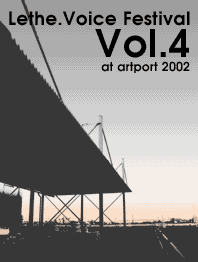| |
【水谷聖 feedback system】
80年代より活動。89年に1st LP リリース。以後ソロ活動。ノイズを聞くものとしてとらえる中で、いくつか実験をくりかえす。現在Soundscape
に傾倒中。ライブはフィードバック音を使った音のあり方の実験。
「およそあらゆる物が、音を作り出す素材として考えられます。それらの中にはうまく音を出す物もあれば、全くダメな物もあります。ではそれらの物は音を出す以前にあらかじめ存在し、その後で音を出していると言い切れるのでしょうか。
一つの音風景を恣意的に作り出す、あるいは再構築するという事の意味は、やはり新 しく音をとらえ直すという事にあると思います。こういった場はその意味で貴重であ
り、重要なものだと思います。」
私の活動の中で最も興味を抱いていることは音の中の構成要素の存在についてです。ある要素は音を素晴らしくする、またあるものはそのような働きをもたない、けれど音という物質は存在しています。では、だからといって存在の後に要素が音を与えると言えるのでしょうか?それとも我々は知覚した後に存在を認識しなくてはならないのでしょうか?全ての環境から音を取り出す方法、例えばサンプリングやダビング、は効果的です。それらの行為によって音は新たな存在となるからです。物質の存在そのものはどうでしょうか?もし物質が知覚の後に位置付けられるのならば、知覚の後に存在があるはずです。知覚とは何でしょうか?我々が何かを知覚したとしたら、それは我々がそれと新しい関係を構築したといえるのです。もしも知覚という事実が全ての関係の中の一部であるとしたら、知覚は全ての関係媒体の中に含まれているのです。私はここで音が作る風景理論というものが大事になってくると思います。何故、音そのものがここでそんなに問題となってくるのでしょうか?私はある、最初から存在する音がその音楽を追求する元素であると考えています。音楽を作るという衝動は音そのものを探究しようという欲望にからに他なりません。音楽によって、音を追求しようという動機が呼び起こされるわけです。この点からも我々は音風景というものを理解しているのです。この理論によって社会的もしくは自然の関係の中にある音をつかむことが出来るのです。私たちはここで強く、音を違う視点から聴くことを求められます。例をあげると、音の順列、音色などの順番は特別な意味を持っています。もっといい例としては鳥のさえずりでしょう。それが聞こえてくる時、私たちはそのさえずりの身体的反応と生理的反応にだけ注目するという習慣を捨てるように作られているのです。
Kiyoshi Mizutani : feedback
system
Started his activity since '80s. Released first album in '89.
Since then he has been a solo player. He keeps repeating some
experiments while he regards the noise as the music that can
be listened to. Now he is absorbed in the Soundscape. On his
live performances, he experiments how to make the sound exist
by using feedback sound.
[Almost everything, can be considered as materials that can
produce the tunes. Some of them can produce the sound well,
and the others can't at all. How can you tell that those materials
exist before producing the sound and producing the sound afterward?
To produce or reconstruct one sound scene arbitrarily has
the meaning to regard the sound afresh again. I think the
opportunity like this event is very significant, for the meaning
as stated above.]
In my work, most of all
my interest is in the existence of sound matters. Some of
them give the sound well, the other is not. Anyway the matters
exist. So, can we say that it gives the sound always after
the existence? Or should we recognize the existence comes
after the perception? How can I express the existence itself?
Every way of method which cut up the sounds from its surroundings,
for example sampling or dubbing, is effective. Because in
that case the sounds get the newer existence. So how about
existence of matters itself? If the matters come after the
perception, there is the existence which is got after the
perception. What is the perception? If we perceive something,
it means we create the new relation with it. If the fact of
perception is one of the parts of the whole relation, it means
the perception is included in the whole relation. In this
point, I think soundscape theory is important. Now, why does
the sound itself become such a question that much? I think
music explored the sound itself from the beginning. The impulse
to create the music is with a desire to explore the sound
itself. There is the exploration motivated by the music. And,
I think we can understand the soundscape theoly also from
this viewpoint. This theory catches the sound in social or
natural relations again. Here we are required deeply listening
in different way. For example, The number of sound, a tone
and that order have special meaning, and our attention is
called there. Perhaps good sample is a song of birds. When
that is heard, we are made to get rid of the habit that it
is paying attention only on the physical or physiological
side of the sound.
www.kaon.org/kiyoshi_mizutani/index.php
|








